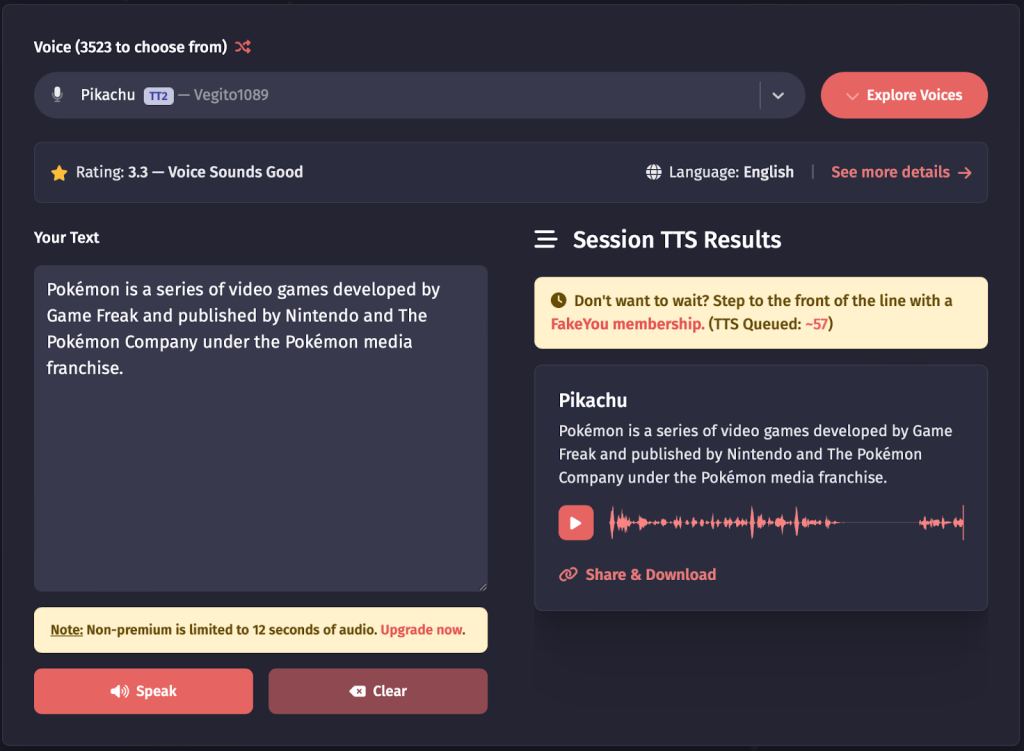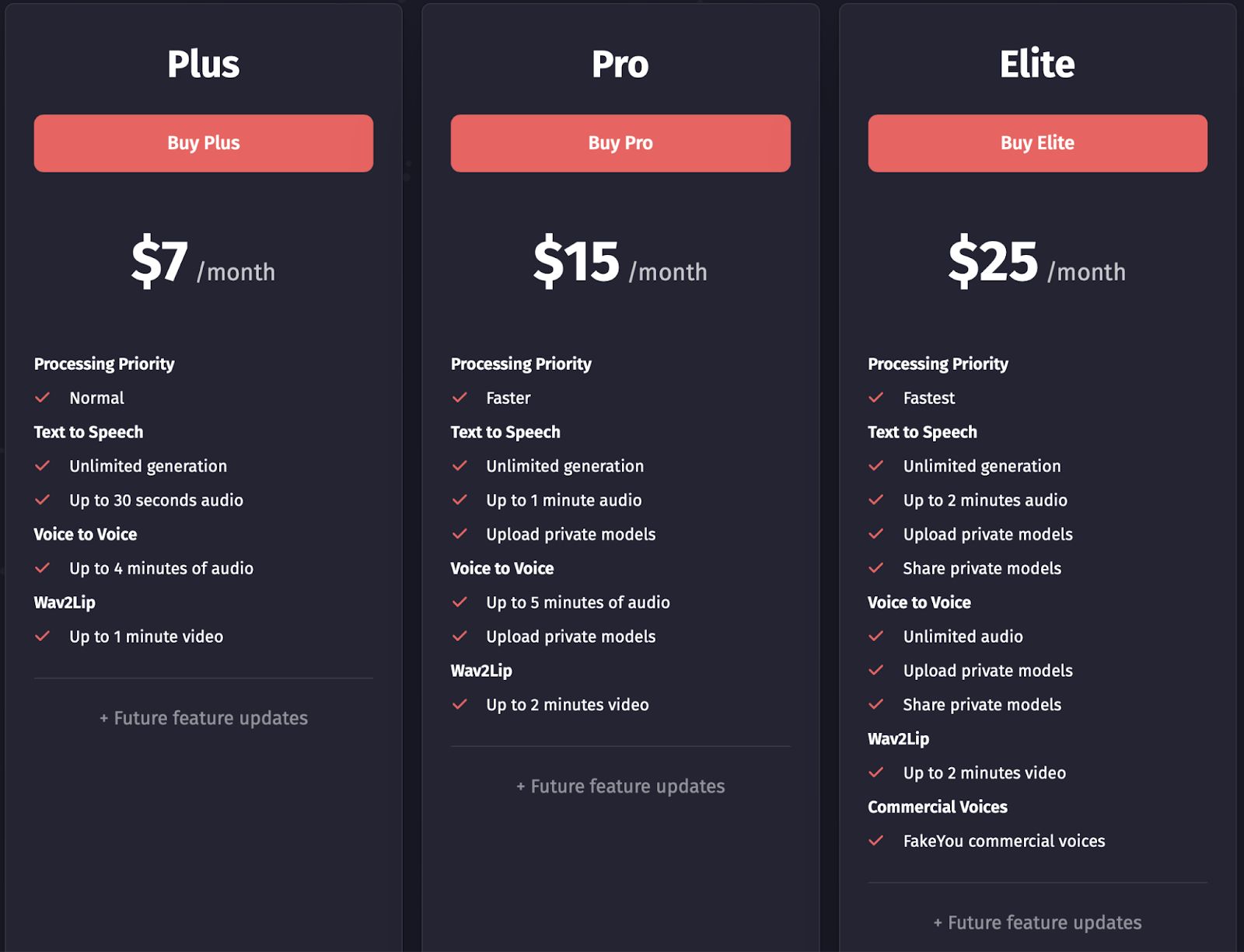FakeYou: What is It and a Detailed Review [2025]
Updated December 16, 2024
Published September 27, 2023
![FakeYou: What is It and a Detailed Review [2025]](https://cdn.sanity.io/images/isy356iq/production/262d55065127f4d644c3902f540b10251ce0e3b1-1200x800.jpg?h=260)
Our Verdict
We liked FakeYou’s approach towards being a community-driven platform that hosts various pre-defined AI voices inspired by video game characters, YouTubers, and famous personalities. Its robust TTS and Voice-to-Voice tools allow users to create audio content using AI and Deepfake technology. Users can use the platform’s tools for free with specific voice or video creation limits.
However, we’ve encountered an issue with the Video Lip Sync (Wav2Lip) feature since it didn’t work as expected, a significant letdown for most users. Also, FakeYou isn’t ideal for content creators since it only grants users a limited usage license—they can only use the content made on the platform for personal and non-commercial purposes, except for exclusive AI voices on its Elite plan. Unlike other AI-powered TTS tools, it doesn’t have voice customization options and only has limited language support.
Best For
Voice actors, and AI Deepfake hobbyists
Pricing
Free to $25/mo.
Freemium
Up to 12 seconds of audio on the TTS tool
Pros
- User-friendly
- Freemium version available
- Over 3,000 AI voices for Text-to-Speech feature
- Has voice-to-voice and Video Lip Sync (Wav2Lip) capabilities
Cons
- Lacks AI voice customization options
- Nonfunctional Video Lip Sync feature
- Limited accent diversity on voices and supported languages
Ease Of Use
4.5
Value For Money
3.8
Features
3.6
Speed
4.3
What is FakeYou?
FakeYou is an AI-driven text-to-speech, voice-to-voice, and video lip-syncing platform that allows users to create content inspired by their favorite characters and famous personalities using Deepfake technology. It has over 3,000 user-generated AI voices for its TTS feature; users can also upload new voices and video templates to the platform for everyone to use.
Is FakeYou Right for You?
We recommend FakeYou for users if:
- You want to create Deepfake voice content for commercial and personal purposes quickly
- You like creating Deepfake videos of known personalities, newscasters, movie scenes, etc., using different audio
- You want to contribute to FakeYou’s community by uploading your custom Deepfake AI voice model
FakeYou might not be suited for users who:
- You’re a professional voice actor who wants studio-quality AI voices for your voice content
- You want a functional Video Lip Sync feature that creates entertaining Deepfake video content
- You’re a content creator wanting to use Deepfake videos to make your content more engaging
Pros & Cons of FakeYou
Pros
User-friendly interface
FakeYou has an easy-to-use interface on all its tools, enabling non-techy users to create Deepfake content.
Freemium version available
Users can access Text-to-Speech, Voice-to-Voice, and Video Lip Sync features on their site for free on specific limits.
Over 3,000 AI voices on the Text-to-Speech feature
Users can utilize up to 3,000 user-generated AI voices on its TTS tool, primarily including Deepfake models inspired by movie and anime characters, known personalities, etc.
Has Voice-to-Voice and Video Lip Sync (Wav2Lip) capabilities
FakeYou has a voice cloning tool (Voice-to-Voice), enabling them to clone their voice to one of their AI voices. They can also create Deepfake video content by uploading their custom audio file (Video Lip Sync).
Cons
Lacks AI Voice customization options
Unlike other AI-powered TTS platforms, users cannot customize the voice’s speed, pitch, or mood while using it for text-to-speech tasks.
Nonfunctional video lip sync feature
In our experience, the Video Lip Sync feature was essentially nonfunctional and didn’t create the Deepfake video content using our uploaded audio.
Only exclusive AI voices on Elite Plan are for commercial use
Users must subscribe to the platform’s Elite plan to access exclusive AI voices that can be utilized for creating voice content commercially.
What Sets FakeYou Apart
Unlike other AI-powered TTS tools like Speechify, Murf AI, and Listnr, FakeYou has various user-generated AI voices inspired by celebrities, famous movie personalities, and more for deepfake content. It’s easy to use and utilizes Wav2Lip technology to bring a unique experience for users when making video content. Users can also contribute to FakeYou’s community by uploading their custom AI voice, video snippet, and voice-to-voice model.
Key Features
As an AI-driven text-to-speech and video lip-syncing platform, FakeYou has the following core features:
Text-to-Speech
One of FakeYou’s main features is its Text-to-Speech tool. It lets users create audio content by inputting their desired text. Using user-generated AI voices, they can create content inspired by celebrities, movie and anime characters, YouTubers, and much more.
The tool shows a star rating for each AI voice (community-generated feedback). For instance, we’ll let Pikachu say what Pokemon is according to Wikipedia:

After a few seconds, it generated a 10-second audio of Pikachu saying our input script. As the rating suggests, the AI audio sounded satisfactory and artificial for the most part.
The Text-to-Speech feature is an excellent tool for users who want to experiment with different voices and scripts since the tool allows unlimited audio generations with a 12-second limit. However, some AI voices may sound robotic and artificial; the waiting time for each audio generation can also be longer depending on the site’s number of users.
Video Lip Sync
Another key feature of FakeYou is Video Lip Sync. It’s based on an open-source project called Wav2Lip, a deep learning-based technology for lip-syncing videos to a target speech. The tool contains various user-generated video snippets from famous movie scenes, newscasts, and still images inspired by famous personalities and meme characters. Users can send their feedback using the comment section at the bottom of the page.
In this example, we’ll insert a recording file in a newscasting scene of Anderson Cooper (famous CNN reporter):

Unfortunately, after minutes of waiting, the tool didn’t upload the audio and integrate it into the video clip. We experienced similar results on other featured video clips on the Video Lip Sync tool.
While the Video Lip Sync feature is one of the main features that makes the platform unique—it wasn’t working, and the tool didn’t meet our expectations.
Pricing
FakeYou offers three main pricing plans, each with an increasing number of features and access to future feature updates:

Plus
The Plus plan is ideal for users who want more extensive video and audio limits and starts at $7 monthly. It offers unlimited generations of up to 30 seconds of audio on its Text-to-Speech tool, up to 4 minutes of audio on Voice-to-Voice, and up to 1 minute of video using Wav2Lip.
Pro
The Pro plan is suited for independent content creators and Deepfake hobbyists and costs $15 monthly. It offers everything from the Plus plan, including faster processing times, 5 minutes of audio on Voice-to-Voice, and 2 minutes of video on Wav2Lip. Users can upload their private models for the platform’s different features.
Elite
The Elite plan is for commercially driven content creators and voice actors and starts at $25 per month. It offers everything from the Pro plan, including the fastest processing priority, unlimited audio generation on Voice-to-Voice, and access to the platform’s exclusive commercial AI voices. Users can also share their uploaded private models to FakeYou’s Discord community.
Check here to learn more about the platform’s pricing plans.
Final Thoughts on FakeYou
FakeYou offers three main AI-driven features (Text-to-Speech, Voice-to-Voice, and Video Lip Sync) for content creation. It has an easy-to-use interface that allows users to use the platform’s main features on its free version. However, we’ve encountered significant software issues, especially the Video Lip Sync feature.
We gave it a 3.9 out of 5 rating mainly due to its nonfunctional Video Lip Sync tool and mediocre quality on most user-generated AI voices. However, we found its TTS feature to be an efficient and fun tool for generating content inspired by famous movie characters, celebrities, and more.
Overall, we still recommend FakeYou for users who want to create Deepfake-based content for personal use and experiment with various user-generated AI voices as a hobby.
Frequently Asked Questions
Share This Post
Ada Rivers
Ada Rivers is a senior writer and marketer with a Master’s in Global Marketing. She enjoys helping businesses reach their audience. In her free time, she likes hiking, cooking, and practicing yoga.
Allow cookies
This website uses cookies to enhance the user experience and for essential analytics purposes. By continuing to use the site, you agree to our use of cookies.



![Murf AI: What is It and a Detailed Review [2025]](https://cdn.sanity.io/images/isy356iq/production/f755565a163e4f7e16f8f0732f49c61365081fe0-1200x800.jpg?h=200)
![ElevenLabs: What is It and the Ultimate Review [2025]](https://cdn.sanity.io/images/isy356iq/production/07634b4fbac97dae1819c492dcecf7edb957c8c8-1200x800.png?h=200)
![Uberduck AI: What is It and a Detailed Review [2025]](https://cdn.sanity.io/images/isy356iq/production/c9fa6f8e7654b4bfb0e88e4b11e6a2f5fefcba0b-1200x800.jpg?h=200)
![PlayHT: The Most Realistic Text-to-Speech AI Voice Tool? [2025]](https://cdn.sanity.io/images/isy356iq/production/152a700fdc7e0a5e8f80e5cacc3672943505c5f3-1200x800.jpg?h=200)